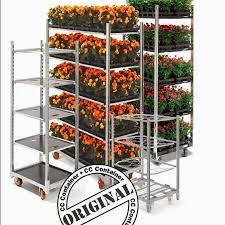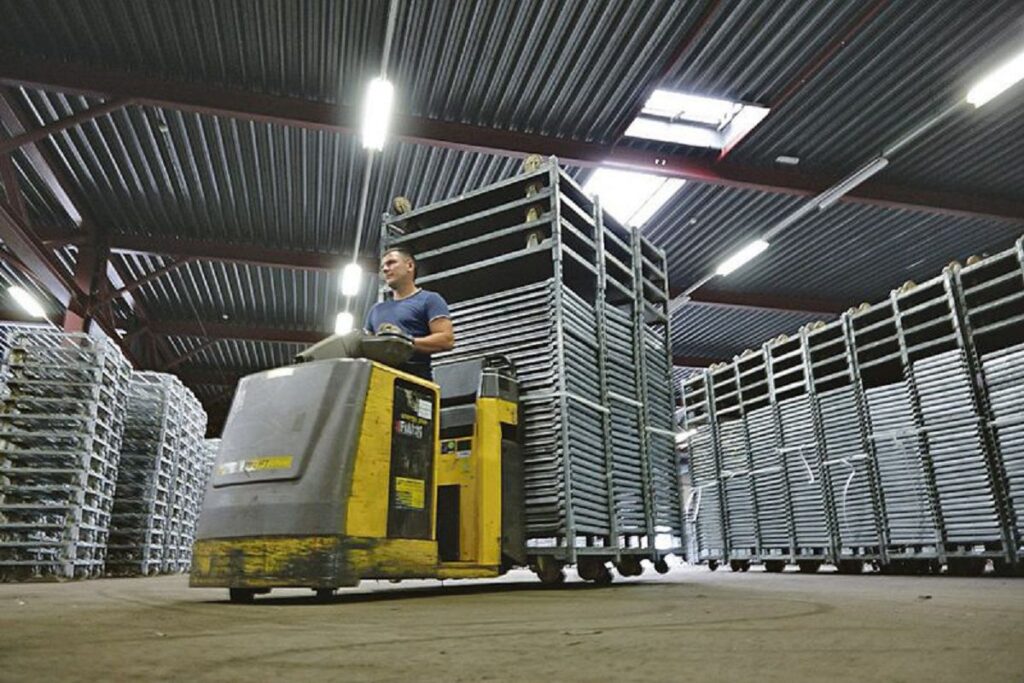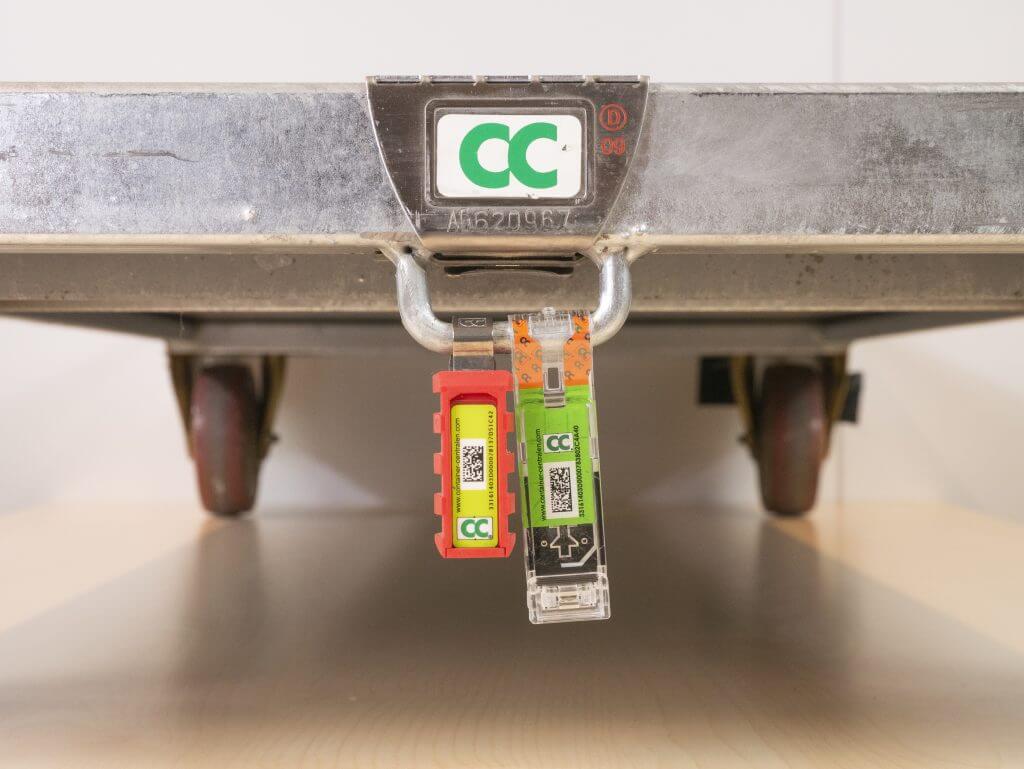RFID location tracking plays in important roles in transporting flowers and plants.
European horticultural logistics company Container Centralen (CC) has a fleet of more than 3.5 million reusable metal trolleys. To transport flowers and plants from origin to retailers across Europe. The company has about 20,000 retail customers, who themselves have about 80,000 customers. Currently the company is offering an RFID authentication solution to anyone using its trolley.
Solution includes
The solution includes CC’s CC4Scanner app and an Android-based handheld reader. These devices look for RFID tags under the bottom of each cart. And provide a visual indication that neither the tags nor the cart are counterfeit. Lyngsoe Systems provided technical support for the solution. While Nordic ID and Newland provided the reader equipment.

CC has been using UHF technology for RFID location tracking. Which is to track these roll able trolleys — which the company calls containers — for more than a decade. When clients include growers, wholesalers, auction houses and retailers received these trolleys. The company uses trolleys as a logistics service, stacking flowers and plants on the shelves of the trolleys. And then through the supply chain, directly to the stores that display and sell these flowers. They disassembled, stacked and sent back these Empty vehicles to the supply chain for reuse. Or to CC’s nearest warehouse for repair and then back into the supply chain.
How it works
These trolleys have a width of 120 x 45cm and a height of 2m. They are modular in three components: base, support rod and shelf. They can stack them when empty. “That way, we take up less space to ship,” explained CC’s sales director Barto Cleton.
By using a handheld reader in the warehouse to read the tags affixed to the bottom of each cart. CC maintains visibility into the status of its entire fleet of assets. While ensuring that its customers properly charge for service base on carts sent and received.

Traditions
Традиционно, CC companies have only used the RFID data internally. But now, the company is offering a solution designed to provide supply chain RFID tracking services to customers and their customers. Таким образом, customers can benefit from trolley statistics and location tracking information. And share this information with logistics companies to enhance their supply chain mastery and improve transportation efficiency, CC said.
According to CC, one of the challenges that RFID systems are facing is that. More and more counterfeit carts and tags are on CC products. Some merchants are using fake tags that look like CC RFID tags but don’t contain an RFID chip. К тому же, Anja van der Broek, CC’s European project manager. Said CC replaces the labels every 5 к 8 years to ensure paying customers only use genuine labels. And that the development of this change can also lead to “Better performance label”.
Changes
So the company partnered with Omni-ID to develop a new tag, the CC Tag 5. The tags offer authentication and tamper resistance, as well as better performance, said Christian Meinhardt, Lyngsoe’s retail director. CC has applied this UHF RFID tag to the bases of all of its 3.5 million metal trolleys. The company says the CC Tag 5 is tamper-resistant. So if someone tries to remove it from the cart, the chip damages and can no longer function properly.
To accommodate harsh gardening environments, the labels are same to the plastic in car headlights. Tags can authenticate without requiring an internet connection. With the new tags and readers. Customers can manage inventory data on the server by establishing a daily connection to download data from the device’s memory. The company says that by ensuring the authenticity of every trolley, they can accurately bill when customers return any used trolleys. “These tags help us ensure that customer fees match the number of carts in the system,” Clayton said.
Check
To check the authenticity of the trolley. The customer must go into CC’s online store and purchase one or more handheld readers suitable for their purpose. Once technicians installed the app, the handheld reader can identify carts with tags within readable range. Which respond with their unique ID numbers and backscattered brand IDs.
If the tag tampered, the reader will not respond. If the tag is fake, the data read will have no brand authentication. тем не мение, if the reader successfully verify the tag ID, a CC logo will appear on the handheld reader. Proving that the label is genuine, while they identify and authenticate the cart.
CC noted that not every customer adopts RFID technology. But those that do will be able to access the data they need, save labor for manual statistics. And reduce the risk of lost carts. If customers choose to disclose their own RFID tag reading data. CC can use the information collected to better analyze trolley usage across Europe. “We estimate that they cycled trolleys through the supply chain about seven times a year,” Clayton said.
Выгоды
During each rotation, the carts typically pass through five different companies. Growers, transporters, auction houses, wholesalers and retailers. The do not scan every trolley when it passed from one team to another. But they scans upon all arrival at the warehouse trolleys.
В будущем, CC plans to use the new tags and readers internally. Not only to confirm the receipt and transport of trolleys at the warehouse. But also to track those damaged during repairs trolleys. следующий, shippers can track the products themselves by linking barcodes on the pots or print delivery notes to the carts that stack them. Тем временем, Van der Broek said CC rolls out an internal customer-facing app to simplify the process of collecting trolley data.
This in-house app provides CC’s customers with a simple scan function. And they share the data with CC or the customer’s database to help plan the entire logistics supply chain. Only share non-sensitive data, such as logistics or location tracking information about trolleys. “With the new system, we can provide better customer service and know where trolleys unloads. So that we can pick them up and reroute them locally, reducing empty cart shipments,” Clayton said. Our goal is to reduce empty vehicle miles.”
For CC’s customers, data is expected to help them ensure carts are available on-site when they need them. “This will free them from unnecessary labor and the tiring of tracking trolleys,” explains Van der Brook. “Customers will also be able to focus more on flower shipments rather than managing flower carts.” In addition, the data also It can help CC analyze the movement of the trolley over a certain period of time. So as to better serve customers in the future based on the previous situation.
Progress
In March 2021 CC launched a new scanning device. “We’ve had a lot of customers trying out these new products, and we’ve also received a lot of positive feedback,” said Vanderbroek. CC uses an internal version of the app in its own warehouse to get data on the trolleys it receives. Which are Data linkes to specific customers who return those cars, automating the crediting process.
According to CC, demand for reusable trolleys is increasing as they prove to be more sustainable than single-trip, one-way packaging. The automation of trolley data collection applications is part of a global trend in service-based logistics. Clayton calls it “product-as-a-service.”
В будущем, CC expects that more customers and users will deploy stationary reader devices as RFID tag reading on metal becomes more reliable.






